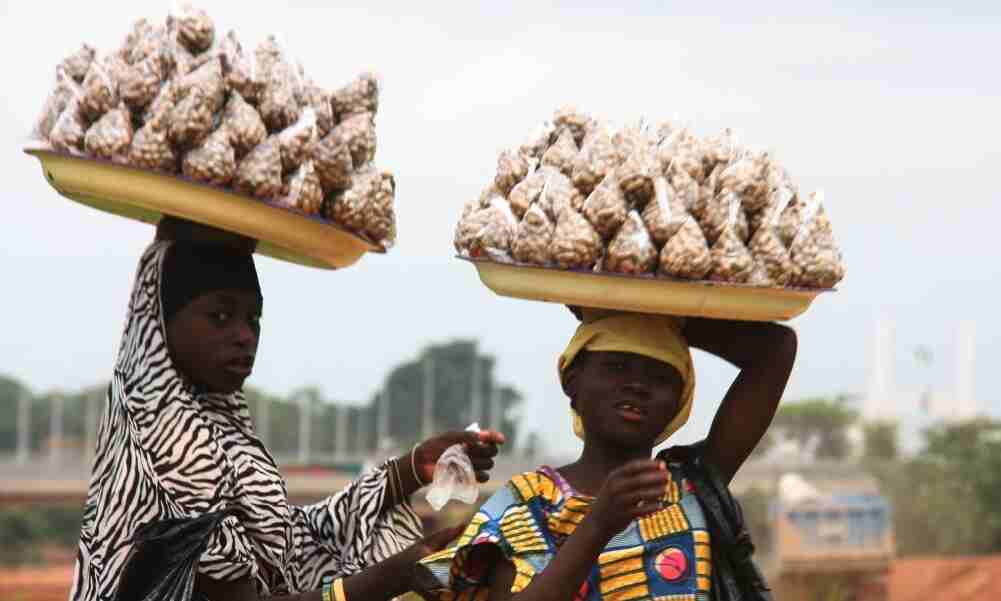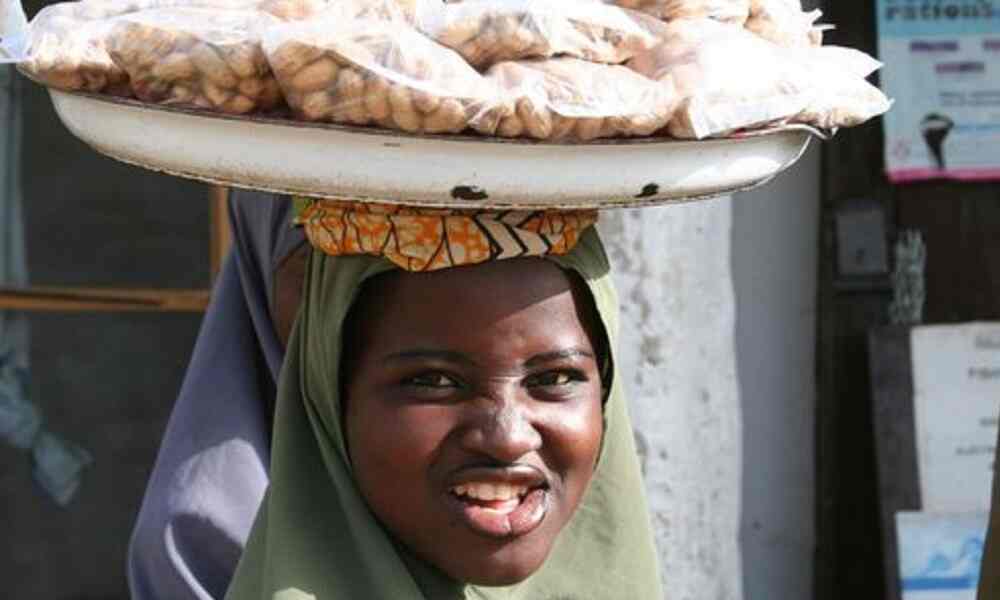As you move in the streets of northern Nigeria or you stop for a refuel at a filling station, wait for your car to fill up in a motor park, wait to pick up your kids in front of school premises or make your way in the market place, you are bound to encounter street hawkers.
These Street hawkers move around calling out the names of their products for people to buy. Some will even address you personally.
Hajiya, this ring will look good on you and it’s just N250.
You can buy pretty much anything from ‘Yan talla’ from a pet to food, to toothbrush, snacks, literally anything.
“Talla” is a general term in the Hausa language for ‘advertisement’, which formal and informal businesses in northern Nigeria use to advertise their products. At the same time, it is used to describe the action of hawking.
To hawk is to informally sell goods in public places. By doing that, one is creating more markets for his/her product. It involves selling goods while going from place to place and persuading people to buy them.
Concept of Street Hawking
Hawking can be seen as a persistent and relentless method of selling goods and services. Its nearly aggressive nature is comparable to that of the legendary ‘hawk bird’, a bird with an excellent sight that can travel thousands of miles to prey.
Likewise, hawkers move from place to place, in search of customers to buy their perishable and non-perishable products. In urban areas, hawking is mostly seen on the streets, targeting mobile and non-mobile customers going about their daily activities.
What is Street hawking?
Street hawking is the act of selling goods and services on the streets to the public. It involves going to largely populated places like roadsides, highways, junctions, parks, or places with high traffic. Street hawking may be static or mobile. That is the sellers may set up temporary kiosks, tabletops, or carry around trays, wheelbarrows, bicycles, and baskets.
Street hawking is popular in developing countries like India and Nigeria. Although street hawking is a general practice in Nigeria, its origin and nature may vary from region to region.
Therefore, we will look at the practice of street hawking in northern Nigeria.
Street Hawking in Northern Nigeria
In northern Nigeria, street hawking is a major means of livelihood for many families. Traditionally, street hawking in northern Nigeria was the offer of goods for sale by going from house to house. For example, the ‘Baban bola’ and ‘Mai kwalabe’ moved from house to house practicing trade by barter.
Later on, ‘Mai Alawa’ and ‘Mai maganin gargajiya’ exchanged candy for money. These hawkers passed by houses while chanting, singing, and playing instruments to attract indoor customers to come out and exchange or buy their wares.

With urbanization and growing poverty and illiteracy, street hawking in northern Nigeria evolved to being the most visible form of informal economic activity. Men, women, and children are now out there every day on the streets hawking as a desperate means of survival. This has caused major nuisance and concern to the northern Nigerian government.
However, many have argued that there are several benefits associated with street hawking and even campaigned for its reformation. Countries like Singapore and India have already implemented reformation practices and reported their benefits.
However, reformation comes with an in-depth understanding of a process that can vary from region to region even within the same country.
This article will look at the factors relevant to street hawking in northern Nigeria in order to understand the process and propose ways of reforming it.
What Causes Street Hawking in Northern Nigeria?
Triggers are what prompt something to happen. In this article, they are seen as what causes or prompts street hawking to exist or continue happening without regulation. Understanding triggers to street hawking in northern Nigeria is essential to providing solutions that are in line with northern Nigeria.
According to many analyses, reports, and research, the two major triggers to street hawking in northern Nigeria are economic and socio-cultural which are as follows:
1. Poverty Increases the Need for Street Hawking for Survival
High rates of unemployment, high cost of living, low wages, lack of social services at home, lack of good housing, inadequate food and health care service in cities with large populations like Kano, Katsina, Kaduna, Sokoto, Zamfara, and Abuja have come together to promote poverty in northern Nigeria.
These have contributed to street hawking as a means for people to survive and support their families.
2. Urbanization Invites more Street Hawkers
One of the easiest jobs for a rural person to do is hawking. Lack of adequate structural facilities and low standard of living in rural or local government areas causes distressed families in rural areas to migrate to the cities. There, they meet a high cost of living and are forced to find work after a few days. Conveniently, they are immediately employed by business owners like sachet water companies to sell and at the end of the day get paid in stipends. They also find roadside food sellers who give them ”Alale’, ‘Danwake’, ‘Gyada’ and ‘Awara’ to hawk.
In addition, low barriers to entry, low start-up costs, and flexible hours make street hawking a one-size-fits-all for all classes of people to go into.
All you need to set up a street Hawking business is your wares, a medium of carrying them, a good market and you are good to go. For example, setting up a corn roasting business involves a handful of corns, a grill, an umbrella for shade, a sit, and fuel to ignite the fire.
People into street hawking can easily engage in other forms of street hawking as a means of survival. A street hawker can sell “Koko” in the morning and “Suya’ at night”.
3. Street Hawking is a Good Marketing Strategy for Large and Small Businesses
Small and large businesses have since identified passing their products through the hawking process as a viable means of selling to more consumers. Formal and non-formal organizations are now strategically incorporating hawking into their selling operations as an effective way of direct seller-buyer relationship. There, they have better consumer feedback, consumer goods accessibility. and increase their product design innovation.
Examples are telecommunication companies like M.T.N, Glo, or Airtel who use music and entertainment to advertise sim cards and at the same time hawk them to passersby. Rather than sit at a shop, a traditional herbalist would rather find a speaker connected to a moving car and call customers to his product.
4. Uncoordinated Marriage and Birth Practices Increases the Need for Street Hawking
People use hawking as a means for girls to gain social exposure and find suitable suitors for early marriages. While doing that, they are at the same time using the profit gained from hawking to finance the wedding expenses and maintain their aesthetic looks. It is common to see a young street hawker in northern Nigeria in her teenage years painting her face all over with makeup and flirting with whoever cares to give her attention while hawking.
Also, most people in northern Nigeria are in the practice of polygamy. However, planning may not be as popular. As a result, people give birth to more than they can cater for and end up having to force some of them to hawk in order to support the family.
5. Lack of Parental Care/Stability Increases the Need for Street Hawking
Orphans, Almajirai, and other children in northern Nigeria who don’t have financially stable households or who have households where they are severely maltreated or neglected tend to be forced to take care and raise themselves by taking up any jobs available.
Generally, the inability of the family to perform its function in this regard has led to children scattered on the streets or fleeing homes to fend for themselves on the streets where they end up hawking.
6. Ignorance and Illiteracy Increases the Need for Street Hawking
Hawkers or their guardians still living in the past and ignorant of the dangers of the 21st century might be ignorant of some of the realities or dangers associated with hawking and do not prep or caution them against those realities.
On the other hand, people who grew up in an environment where education is not prioritized would rather drop out of school than face their studies. To them, they see education as a waste of time and resources. When that happens, their guardians will happily accept them back and conveniently send them out on the streets to hawk.
7. Family Job History Recycles Street Hawking
Just like some street beggars or wanzamai in northern Nigeria who have idolized and sanctified their hustle, people who grew up in a household where hawking has been passed on many generations are likely to fall into hawking as an occupation even from childhood in order to assist their family. To them, hawking is like an inheritance which they must honour when they grow up also pass to the next generation. Meanwhile, abandoning It becomes like a taboo.
Interestingly, children whose mothers engage in making rice, groundnut, and other food or snacks at home automatically hawk products for her to support her since the average northern Nigerian woman is not as free to move about in the streets as men or children.
8. Environmental and Peer Pressure Advises and Compels Street Hawking
People who live in the ghetto or slum areas of the city are more likely to engage in acts of street hawking than their counterparts who live in highbrow areas. The influence of the environment and friends can stimulate a person into hawking in order to feel part of society.
Nosy neighbours, family, or other well-wishers who are tired of seeing their friends suffer will advise them to go hawking or send their children which they might reluctantly do.
9. Societal Acceptance of Child Labour Normalizes Street Hawking of Children
Most people do not see hawking, especially towards children as against the law. This is because children in northern Nigeria are already used to contributing financially to the wellbeing of the family right from a young age. Boys are sent out to learn crafts and trade with their fathers while girls support their mothers through hawking for products they make at home.
The cultural belief in northern Nigeria encourages treating the child as mere properties of their parents without right of their own including their right to education, right to protection against abduction, right to protection against child labour with the exception of domestic work, and protection against buying, selling, begging and prostitution all of which hawking may affect.
Implications of Street Hawking in Northern Nigeria
We have looked at what triggers people to engage in street hawking in northern Nigeria. The next question is in what ways do these triggers and the street hawking process affect the northern Nigerian citizens and government? The implications of street hawking in northern Nigeria may be positive and negative.
After a thorough analysis of the triggers to street hawking and its process in northern Nigeria, this article outlines the following implications of street hawking in northern Nigeria.
1. Street Hawking Provides Essential Services to Consumers to Meet their Demand
We mentioned earlier that street hawking is a good marketing strategy. Here is why.
Street hawking in its informal and haphazard nature ensures it meets the basic daily needs of people. They make available goods and services at the right place and time at affordable rates.
Imagine being hungry in a park or garage and you can’t afford the distance or money for the nearest eatery. Or you are hurrying for a class after dropping from public transport and your shoe cuts.
Your survival and punctuality depend on these street hawkers. Street hawkers make available cold drinks to you wherever you are during hot weather and sell dates or sesame seeds while you are traveling to ease your journey. Street hawkers generally operate in a way that they meet the exact demands of consumers at the right place and time.
2. Street Hawking also Contributes to The Economy
A bad economy that leads to poverty is the biggest trigger to street hawking in northern Nigeria. A large portion of efforts made towards street hawking is to manage and alleviate poverty.
But you will not believe the millions of naira formal and informal businesses make from street hawking yearly. Formal businesses in particular help keep the economy moving by ensuring money is continuously in circulation, paying taxes, and making room for employment.
An example is an ice-cream company that dispatches to street hawker’s ice-cream to sell to children after school hours or a cosmetic company having their products taken to the most remote places to be sold.
3. Street Hawking Goes Against the law
Hawking triggered by lack of parental care/stability, ignorance and illiteracy, and societal acceptance of child labor all point towards child street hawking and of course breaking the law.
Child street hawking opposes the 1989 UN Convention on child rights which Nigeria is a signatory to. It states that involving children in an activity that impacts negatively on their health and well-being is wrong and that the need for the government needs to protect children from exploitation.
4. Street Hawking Promotes Unethical Economic Activities
The practice of black marketing, smuggling, price undercutting, and other bad business practices continue to rise as a result of street hawking.
The circumstances and lack of formality surrounding its formation make it very hard for these practices to be controlled or their proprietors caught.
5. Street Hawking Contributes to Environmental Pollution and Disease Spread
There is no limit to what is sold on the streets. Anybody can sell anything disregarding sanitary measures with nobody to check them. Noise and land pollution can occur as a result of verbal advertisement and constant littering of the streets and public spaces. This can cause discomfort to passersby or attract disease vectors to act on the litter and cause diseases.
The absence of proper sanitary procedures by some of these hawkers contaminates edible products which may harm consumers and cause diarrhoea and food poisoning. Furthermore, various STDs like HIV are easily transmittable by these hawkers who practice unprotected sex and then transfer the virus through their wares.
6. Street Hawking Encourages Child Exploitation and Labor
As we said earlier, child street hawking is against the law. The reason is that many children are taken advantage of by adults through the process of street hawking. Cases of child sexual abuse, child trafficking, child labor, and robbery of goods all happen as a result of children being sent out to the street to hawk.
They encounter people who use misuse their authority as adults to physically and mentally abuse children who are out there on the streets hawking.
7. Street Hawking Poses Physical Dangers and Hazards to Hawkers
No one is more desperate than someone looking for a penny to eat. People knee-deep in poverty that hawk on the streets are occasionally subjected to accidents while hawking their wares on the roads. Sometimes they chase moving vehicles at the expense of their own safety.
Street hawkers are also subjected to weather hazards, robbery, sexual abuse, and other kinds of physical violence from their customers and criminals.
8. It Promotes Illiteracy Among Children Especially the Girl Child
It is hard to break the cycle of illiteracy when people are constantly dropping out of school to hawk. This poses more danger to the female children as they are more subjected to hawking than their male counterparts. The reason is most times; they have to assist their mothers by hawking her products for her.
Also, these children are married off as soon as possible without being given proper education. There they give birth and continue the cycle.
9. Street Hawking Recycles Poverty
While people may depend on street hawking to survive, it is hardly a way of living that will support the next generation to come.
Since hawking can be inherited and does not have any potentials for career development and social mobility, neglecting education and other means of survival will only recycle poverty by passing on the business to generations to come.
10. Street Hawking Depreciates Moral Values and Elevates Criminal Behaviours
We have talked about Lack of parental care/stability, Ignorance and Illiteracy, and Environmental and peer pressure as triggers to street hawking in northern Nigeria, all these may combine to cause unhealthy mingling of people of different moral backgrounds. There on the streets, different kinds of people both children and adults mix with other people of terrible upbringing that end up contaminating any moral training they might have received from their guardians.
The males fall into activities like drinking, smoking, drugs, and thievery which cause them to fall into physical and sexual violence, dishonest dealings. robbery and dummies in the hands of politicians.
As for the females, they may also pick up similar traits or serve as accomplices to crimes of their male counterparts Worse, young girls who are whipped by their caregivers whenever the profit Brought home is not much or they don’t sell all their wares, get desperate and are easily lured into prostitution.
How to Reform Street Hawking
In the past, street hawkers who have been threatened with eviction in the southern part of Nigeria became transient, resilient, and adaptive. They changed strategies, mode of operation, and some of them even resorted to crime.
At this stage in Nigeria’s economy, the government cannot continue to ignore the growing importance of street selling in creating a stronger economy. businesses and the government need to be prompt and innovative in order to consolidate the benefits of hawking and move Nigeria closer to the achievement of some of the United Nations Sustainable Development Goals (SDGs).
Looking at the triggers and implications of street hawking discussed in this article, it is clear that although street hawking has its very fair share of negative triggers and implications in northern Nigeria, one thing clear is that the positive triggers and implications all point towards making the Nigerian economy better. This will help in alleviating poverty and naturally reduce the need for hawking itself.
The reformation of street hawking in northern Nigeria shall work towards strengthening the positive and eliminating or managing the negative triggers and implications. Some of the proposed ways of reforming street hawking in northern Nigeria include;
1. Reduce the Need for Hawking for Survival by Addressing Economic Triggers
First and foremost, economic issues which intensify the need for hawking for survival should be addressed. Improving the standard of living in rural areas through the provision of adequate and working infrastructural facilities will create more employment and reduce the migration of people from rural to urban areas.
The parents of children who street hawk should be empowered economically in order for them to be able to take care of them. The creation of more job opportunities and better pay for those already employed increase family income and give parents the opportunity to take care of their children without sending them out to hawk.
2. Strengthen the Child Education System by Providing More Free Education and Vocational Studies to Children
Since illiteracy is one of the root triggers and implications of street hawking, the government should provide more tuition-free compulsory basic education for all children in northern Nigeria, that is declare education especially at primary levels free and compulsory for all children.
In addition, the northern Nigerian government should ban child street hawking during school hours to reduce the practice during school hours.
Also, since some children would still like to acquire vocational skills, it should be made part of the free education so that children that wish to learn vocational skills can be assisted. Doing this will help curb Ignorance, Illiteracy, and law violation against child acts and labour.
3. Propose Better Ways of Supporting Children’s Participation in Economic Activities
Because of the high degree of societal acceptance of child labour in northern Nigeria and the presence of poverty, it is almost impossible to stop parents from engaging their children in labour for profit.
So currently, rather than eliminating children’s participation in economic activities, there is a need to support the children’s working lives, that is, looking into their working conditions and seek ways to find better solutions.
This could happen either by providing a platform attached to the school where children can acquire vocational studies in schools while participating in economic activities like sowing, tie and dye, shoemaking, and so on based on what they have learned right in school.
This way, they will get an education and still be able to make a profit to assist their parents.
4. Strengthen the Child Right act to Protect Children Against Abuse, Exploitation, and Labour
The 2003 legal framework for the implementation of the child right act for the protection of the girl child, child labour, and abuse should be revisited and strengthened.
This act prohibits child marriage and betrothal and gives the new legal age of marriage of girls as 18, thus hindering its acceptance by northerners because of the northern practice where girls get married off once they reach puberty. This should be sorted out and the child rights act should be urgently adopted and enforced in northern Nigeria.
5. Support NGO’s Advocating for Child Rights
Both the government at all levels and citizens should strive to show more support to child rights NGO’s operating in northern Nigeria by giving them financial aid, political aid, and by volunteering.
6. Put up Formal Regulations and Structures to Modernize Street Hawking
As a viable part of the economy, street hawking lacks formal recognition by the government. Policies need to be put in place to formally recognize informal sector businesses including hawkers. Taking into consideration that making the policies relatively easy and cheap to sign into will make them more attractive which will attract more employment.
Also, providing codes of conduct and penalties will provide stability within the structure and make it easy to curb ethical and criminal violations.
Formalizing street selling also involves not only putting up policies but formal structures as well. Market places or hawker centres for street vendors should be put up with little taxation. This has been tried in Singapore and has proved successful.
Doing the above will modernize street selling and make it a legally recognized distribution channel that will boost the Nigerian economy and address pollution as well as unethical, immoral, and illegal activities.
7. Create More Awareness on Realities/dangers of Hawking, Family Planning and Importance of Education to Children, Parents, and Guardians
Parents and guardians need to be properly enlightened on the realities/dangers of street hawking to help regulate or improve moral values, criminal behaviours, disease spread, child exploitation, and physical hazards.
The importance of family responsibility and planning should be emphasized especially towards the household’s heads, guardians, and any other party concerned with the well-being of children. They should be prepared to play their roles in the households Unless they do, women and children will continue to be forced to look for other means of sustainment and survival.
Furthermore, doing so will reduce the number of uncoordinated marriages, uncoordinated birth practices, lack of parental care, child exploitation, and instability in homes. Children should also be enlightened at a very young age in school about the importance of education before they drop out.
Likewise, P.T.A. meetings should be encouraged regularly in public schools where issues relevant to education are discussed between guardians and school authorities. This will help in addressing issues concerning Ignorance, Illiteracy, violation of the child rights law, and poverty recycling.
Enlightenment should be done through community meetings with local traditional and community leaders. Television and radio will also serve as mediums to pass across messages to people in northern Nigeria.
Conclusion
Adopting and implementing these reformation processes will be a major step towards reforming street hawking in northern Nigeria. Drop your suggestions on more ways we can reform street hawking in northern Nigeria.
Glossary
Talla: Hausa term for ‘advertisement’ or ‘street hawking’.
Baban bola: Local trader who moves around collecting recyclable items like electronic and machine parts, plastics, rubbers, and exchanges them with other items or money.
Mai kwalabe: Local trader who moves around collecting empty bottles in exchange for other items or money.
Mai maganin gargajiya: Traditional herbalist
Alele: Hausa term for moimoi
Danwake: Hausa term for
Gyada: Hausa term for groundnut
Awara: Hausa term for soya beans cake
Koko: Hausa term for pap
Suya: Hausa term for kebab
Almajirai: Plural term for Almajiri in Hausa language meaning street beggar.










0 Comments